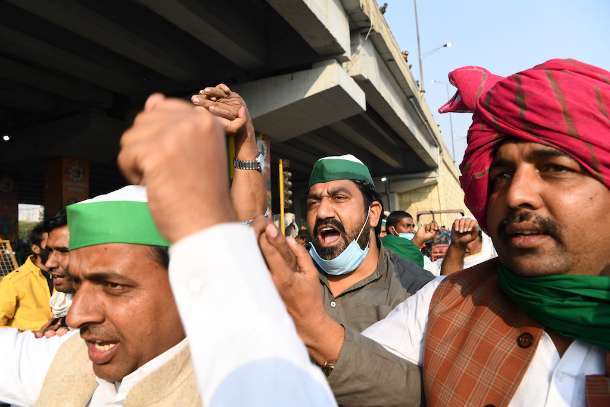Church supports Indian farmers’ struggle against lopsided laws
Unions say the laws leave millions of marginal farmers at the mercy of multinational companies

Catholic Church leaders have pledged solidarity with thousands of Indian farmers who are protesting on the borders of New Delhi demanding the repeal of three controversial farm laws enacted two months ago.
Thousands of farmers from Punjab have blocked entry and exit points to New Delhi after police stopped their march to the national capital. Farmer unions on Nov. 29 threatened to block all roads to New Delhi if they were not allowed to demonstrate on a public ground within the city.
They want the federal government of Prime Minister Narendra Modi to unconditionally withdraw the laws enacted on Sept. 20 as part of farm reforms.
“These laws are not meant for the welfare of the farmers, and if they are implemented in the current form, it will be disastrous for the small and medium-level farmers,” said Bishop Alex Vadakumthala, chair of the Indian bishops’ commission for labor.
“The farmers’ demands are genuine. The government should listen to them and repeal the controversial laws for the interest of the county,” said Bishop Vadakumthala of Kannur Diocese, based in the southern state of Kerala.
The police action attracted more farmers to join and forced the government to invite their leaders for a conditional negotiation. The government also allowed them to gather in a smaller public ground in the Burari border but within the city.
The farmers have rejected the offer to move to Burai and decided to stay at the border until the government decides to withdraw the federal laws.
The Farmers’ Produce Trade and Commerce (Promotion and Facilitation) Act, 2020, and the Farmers (Empowerment and Protection) Agreement of Price Assurance and Farm Services Act, 2020, aim to reform the farm sector.
Protests began immediately after the draft bills were released, but the government ignored them and passed the laws.
Punjab and Rajasthan states, where the opposition Congress party runs the governments, passed a law to overrule the federal law. However, implementation of these state laws will be subject to the consent of the Indian president, who has already cleared the controversial federal laws.
More than 70 percent of India’s 1.3 billion people directly or indirectly depend on farming for their sustenance. But some 80 percent of them — over 700 million — are marginal farmers with less than two hectares of land.
Bishop Vadakumthala told UCA News that the new laws would hit the marginal farmers who will have “no power to bargain” for their product’s price.
“But these laws are beneficial to multinational companies, which can store farm produce indefinitely at their will and sell them when they feel like it. Such a situation is perilous for farmers and for consumers,” Bishop Vadakumthala said.
“The multinationals will also decide what the farmers should produce and control the agriculture sector at the cost of the farmers.”
Farmers and opposition leaders say the Modi government, ever since it came to power in 2014, has been formulating laws and policies to help private companies at the cost of farmers.
“The farmers are the backbone of this country, and if the backbone is broken, no one will be able to stand up,” the bishop said, urging the government to revisit its laws with a focus on the poor.
‘The government should take a more lenient view towards the demands of the farmers failing, which would spell disaster for the farming community in the country.”
Father Joseph Ottaplackal, chairman of the Indian Farmers Movement (INFAM), a church-backed body based in Kerala state, said the government needs to take “a more lenient view towards the demands of the farmers because the reforms spell disaster for the farming community.”
The government should repeal the new laws in the interests of farmers, the priest told UCA News on Nov. 28.
The laws have been introduced at a time when hundreds of farmers commit suicide every year to escape debt. Falling prices of their products and increasing costs made them unable to pay back loans, reports show.
According to National Crime Records Bureau data, distress in the farm sector led to the suicides of 12,360 farmers or farm laborers in India in 2014, up from 11,772 in 2013. Since 2015, the government has not published any data on farmer suicides.



